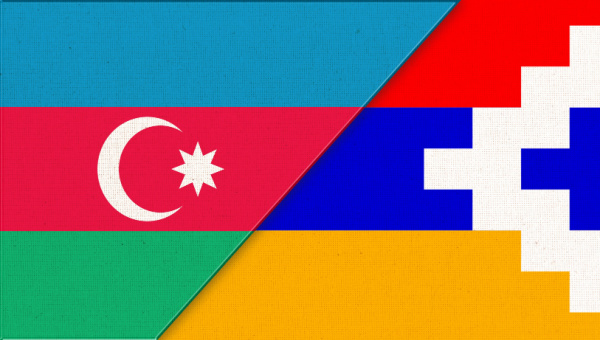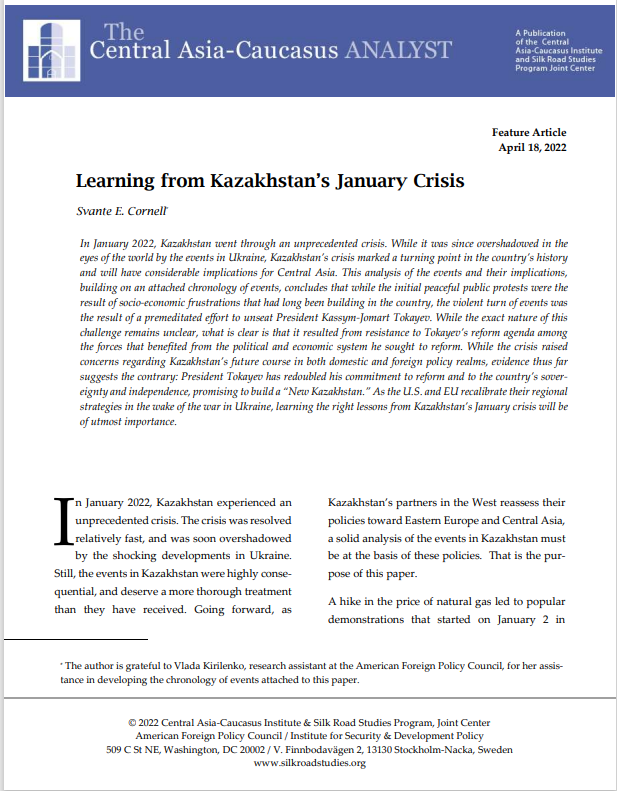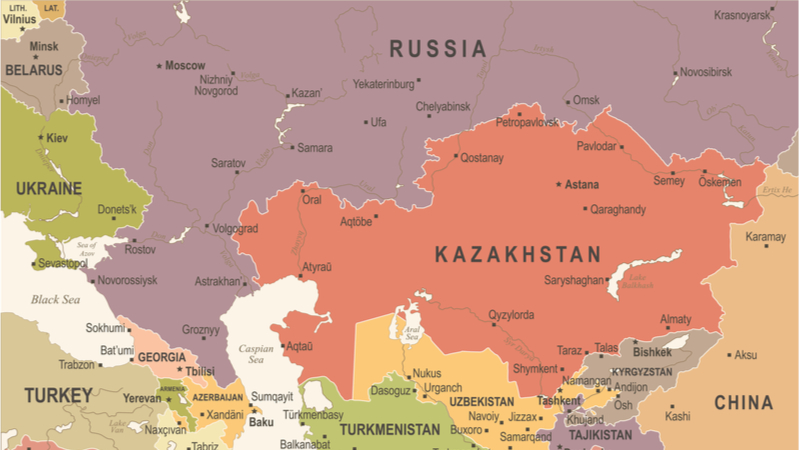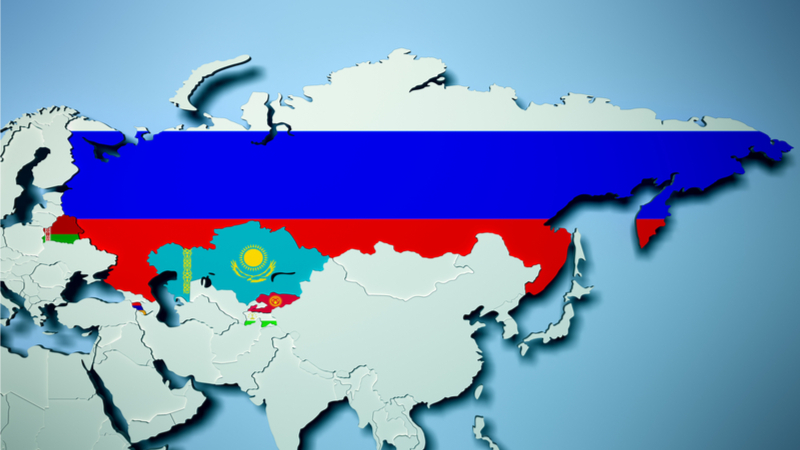Armenia’s Crisis After Azerbaijan's Final Offensive in Nagorno-Karabakh
By Natalia Konarzewska
November 9, 2023
Armenia was hit by a political and humanitarian crisis after Azerbaijan launched a massive military offensive in Nagorno-Karabakh on September, aimed at disbanding its de facto government and armed forces. Yerevan’s refusal to provide military assistance to the separatist region fueled massive protests across Armenia in support of Karabakh Armenians and against Prime Minister Nikol Pashinyan. Simultaneously, relations between Armenia and Russia reached a new low amid Yerevan’s assertion that Moscow failed to live up to its security commitments in the region. As a result of Nagorno-Karabakh’s capitulation on September 20, tens of thousands of Armenian refugees fled the region.

Learning from Kazakhstan's January Crisis
By Svante E. Cornell
April 18, 2022
 In January 2022, Kazakhstan went through an unprecedented crisis. While it was since overshadowed in the eyes of the world by the events in Ukraine, Kazakhstan’s crisis marked a turning point in the country’s history and will have considerable implications for Central Asia. This analysis of the events and their implications, building on an attached chronology of events, concludes that while the initial peaceful public protests were the result of socio-economic frustrations that had long been building in the country, the violent turn of events was the result of a premeditated effort to unseat President Kassym-Jomart Tokayev. While the exact nature of this challenge remains unclear, what is clear is that it resulted from resistance to Tokayev’s reform agenda among the forces that benefited from the political and economic system he sought to reform. While the crisis raised concerns regarding Kazakhstan’s future course in both domestic and foreign policy realms, evidence thus far suggests the contrary: President Tokayev has redoubled his commitment to reform and to the country’s sovereignty and independence, promising to build a “New Kazakhstan.” As the U.S. and EU recalibrate their regional strategies in the wake of the war in Ukraine, learning the right lessons from Kazakhstan’s January crisis will be of utmost importance.
In January 2022, Kazakhstan went through an unprecedented crisis. While it was since overshadowed in the eyes of the world by the events in Ukraine, Kazakhstan’s crisis marked a turning point in the country’s history and will have considerable implications for Central Asia. This analysis of the events and their implications, building on an attached chronology of events, concludes that while the initial peaceful public protests were the result of socio-economic frustrations that had long been building in the country, the violent turn of events was the result of a premeditated effort to unseat President Kassym-Jomart Tokayev. While the exact nature of this challenge remains unclear, what is clear is that it resulted from resistance to Tokayev’s reform agenda among the forces that benefited from the political and economic system he sought to reform. While the crisis raised concerns regarding Kazakhstan’s future course in both domestic and foreign policy realms, evidence thus far suggests the contrary: President Tokayev has redoubled his commitment to reform and to the country’s sovereignty and independence, promising to build a “New Kazakhstan.” As the U.S. and EU recalibrate their regional strategies in the wake of the war in Ukraine, learning the right lessons from Kazakhstan’s January crisis will be of utmost importance.
Russia's War in Ukraine: Implications for Central Asia
By Johan Engvall
March 14, 2022
Russia’s invasion of Ukraine and the West’s economic response to it has put Central Asia in a precarious position. As part of what Moscow perceives as its sphere of interest, the repercussions of Putin’s war are bound to affect the Central Asian countries particularly hard. While anything but static, the nature of the Russia-Central Asia relationship still enables Moscow to retain a strong influence in the region. Russia remains the dominant security actor in Central Asia, even more so following the U.S. withdrawal from Afghanistan. Their economies remain closely interlinked with Russia, and at the political level, a distinct type of post-Soviet authoritarian leadership model with roots in the Soviet system facilitates political dialogue. Western disengagement from the region has left them more vulnerable, but the unpredictable consequences of Russia’s military adventurism might force them to realign their external relations.

U.S.-Russian Cold War - At Central Asia's expense?
By Farkhod Tolipov
February 10, 2022, the CACI Analyst
Two events in December 2021 signified the growing cleavage between the U.S. and Russia: U.S. President Biden initiated the Summit for Democracy while the Kremlin proposed a treaty between the Russian Federation and the U.S. on security guarantees, purportedly to ensure the security of the Russian Federation and NATO member states. Both initiatives pose challenges to the former Soviet republics of Central Asia in terms of their independence as well as their long-term perspective of political development. These events test Central Asian countries’ ability to withstand neo-imperial pressure, as well as their stated commitment to democratic choice.

Kazakhstan’s Stress Test: The January Tragedy and its Aftermath
By Ariel Cohen
January 24, 2022, the CACI Analyst
In the first weeks of 2022, Kazakhstan experienced its most intense protests since the collapse of the Soviet Union. The causes of the turmoil in the country – like any major upheaval – are multi-faceted and were long in the making. Despite the violence, the speed of crisis resolution is impressive, and the country appears to continue on its path of modernization, reforms, and a balanced foreign policy, which keeps the great powers: U.S., Russia, and China engaged and at a safe distance. Less than three weeks after the violent eruption, the painful “lessons learned” period has begun.






